 |
Large Medium Small |
|
 Apart from sleep, Bao Guotong, in his late 60s, spends most of his time musing in his wheelchair at Songtang Hospice in Beijing. Cui Meng / China Daily
|
BEIJING - Zhang Lan'e, 52, stood helplessly beside her eldest sister's bed in Songtang Hospice, one of better known end-of-life care institutions in Beijing.
Her 70-year-old sister, who has been paralyzed for 50 years because of a workplace accident, hasn't been given long to live by the doctors due to medical complications.
Zhang was concerned not only about losing her sister, but was also afraid of getting sick. "Who is going to take care of me when I am old, sick and dying?" she said.
Zhang has only started worrying about this lately - mainly because China reformed its healthcare policy earlier this year.
Previously, medical insurance would pay 80 percent of the cost of prescription drugs, which Zhang would buy for her sister from the hospice's partner, Civil Aviation General Hospital.
But under the reform, Zhang could not buy the drugs from Civil Aviation, resulting in her and her siblings having to pay much more.
Independent hospices such as Songtang are not on the list of hospitals able to provide the drugs at the rebated cost. Songtang has unsuccessfully been applying to be on the list for the past three years.
"Our family is now paying all of my sister's medical expense such as the fees for the end-of-life care and drug bills. I am worried it would become a burden for my daughter when I am dying," Zhang said.
Zhang's only daughter, who is 24, recently moved out from the family home after she started working.
Zhang recently retired from a factory and receives less than 2,000 yuan a month in pension.
"This won't be enough to support me should I get sick and need extensive treatment. I am afraid of dying alone and poor," she said.
Zhu Lin, Songtang's deputy president, said the medical insurance problem is common.
"End-of-life care institutions in China do not get enough support from either the government or the society," Zhu said.
Songtang, the first independent end-of-life care institution in Beijing, has had to move seven times in the past 23 years, mainly because it could not afford the increasing rentals.
The average age of patients at the 380-bed hospice is 82 and Zhu said moving more than 300 elderly people was a huge problem.
Worse, many communities do not want hospices moving in. "Residents have even stopped our ambulances from entering their community," Zhu said. "They think it will be bad luck for their neighborhood."
More than 16,000 people have stayed at the hospice over the years, with more being admitted every month. On average, a patient stays at Songtang for three months.
But Songtang has never received any government money, despite being showered with many awards from all levels of the government.
"We have never received even one cent of government funding since we started in 1987," Zhu said.
Earlier this month, the British Economist Intelligence Unit ranked China 37th out of 40 countries in how well it cared for the dying.
The results, published in The Economist magazine, did not surprise Sun Weiwei, a sociologist from the Central University of Finance and Economies in Beijing.
"It will take at least 30 years for China to build an appropriate end-of-life care system," said Sun, who wrote her doctoral thesis on it.
"At present, the government really has no idea about providing end-of-life care, especially for the aged.
"The elderly needs end-of-life care services the most, but such care is still not part of the social welfare system."
Moreover, end-of-life care is only taught as a foundation course at medical schools in China, rather than an important subject, she said.
"As such, we don't have professional staff for end-of-life care in China at all," Sun said.
The number of people aged above 80 in China reached 18.99 million at the end of last year, and this is increasing by a million each year, a report recently released by China National Committee on Aging (CNCA) said.
But fewer than 2.5 million beds are provided by hospitals and hospices for the aged throughout China.
And fewer than 15 beds are available for every 1,000 old people, which is far behind the rate in Western countries with 70 beds, the CNCA said in March.
"Most countries get into the aging period after the country's development, but China has to face the aging problem while we still need to develop its economy," said Wu Yushao, a vice-president of CNCA.
"There are many problems in our economic foundation, social welfare insurance and social pension system."
Sun said what is needed is for communities to establish end-of-life care centers.
"People would love to spend their last period of life in familiar and caring environment, so the traditional Chinese way of family care should be generally replaced by local communities," she said.
"They want to die with dignity."
China Daily